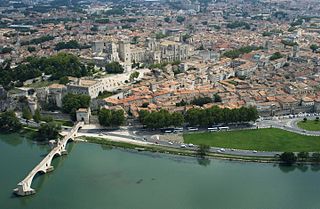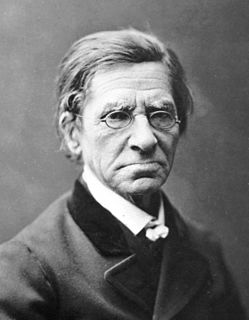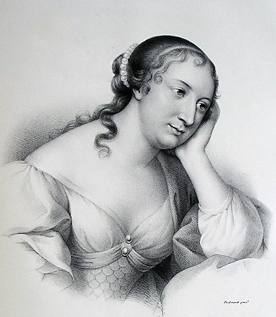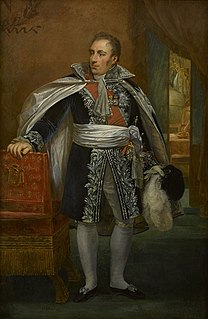
Avignon is the prefecture of the Vaucluse department in the Provence-Alpes-Côte d'Azur region of Southeastern France. Located on the left bank of the river Rhône, the commune had a population of 93,671 as of the census results of 2017, with about 16,000 living in the ancient town centre enclosed by its medieval walls. It is France's 35th largest metropolitan area according to INSEE with 336,135 inhabitants (2019), and France's 13th largest urban unit with 458,828 inhabitants (2019). Its urban area was the fastest-growing in France from 1999 until 2010 with an increase of 76% of its population and an area increase of 136%. The Communauté d'agglomération du Grand Avignon, a cooperation structure of 16 communes, had 192,785 inhabitants in 2018.

Émile Maximilien Paul Littré was a French lexicographer, freemason and philosopher, best known for his Dictionnaire de la langue française, commonly called le Littré.

François Auguste Marie Mignet was a French journalist and historian of the French Revolution.

Charles Augustin Sainte-Beuve was a French literary critic.

Marie-Madeleine Pioche de La Vergne, Comtesse de La Fayette, better known as Madame de La Fayette, was a French writer; she authored La Princesse de Clèves, France's first historical novel and one of the earliest novels in literature.

Joseph–François Michaud was a French historian and publicist.

Louis François Armand de Vignerot du Plessis, duc de Richelieu, was a French soldier, diplomat and statesman. He joined the army and participated in three major wars. He eventually rose to the rank of Marshal of France.

Pierre Antoine Noël Bruno, Comte de Daru was a French soldier, statesman, historian, and poet.

Comte Pierre Louis Roederer was a French politician, economist, and historian, politically active in the era of the French Revolution and First French Republic. Roederer's son, Baron Antoine Marie Roederer (1782–1865), also became a noted political figure.

Jean Denis, comte Lanjuinais, was a French politician, lawyer, jurist, journalist, and historian.

Jean-Nicolas Bouilly was a French playwright, librettist, children's writer, and politician of the French Revolution. He is best known for writing a libretto, supposedly based on a true story, about a woman who disguises herself as a man to rescue her husband from prison, which formed the basis of Beethoven's opera Fidelio as well as a number of other operas.

Claude Bouthillier, Sieur de Fouilletourte was a French statesman and diplomat. He held a number of offices, including Secretary of State and Superintendent of Finances, and distinguished himself in diplomacy throughout the 1630s, particularly in respect to France's entry into the Thirty Years' War.

The House of Talleyrand-Périgord was an ancient French noble house. A well-known member of this family was Charles Maurice de Talleyrand-Périgord (1754–1838), who achieved distinction as a French statesman and diplomat. The family name became extinct in 2003 upon the death of Violette de Talleyrand-Périgord.
Armand is a French masculine given name and surname, the French form of Herman.
Events from the year 1827 in France.

Jérôme-Adolphe Chicoyne was a lawyer, journalist and political figure in Quebec. He represented Wolfe in the Legislative Assembly of Quebec from 1892 to 1904 as a Conservative.

Jules Armand Stanislas Dufaure was a French statesman.

Baron Armand-Marie Ghislain Limnander van Nieuwenhove was a Belgian composer of choral and orchestral works and church music. Knight of the Order of Leopold, he was the founder and conductor of the choral chamber ensembles Société Symphonique and Réunion Lyrique in Belgium.

Aimée de Coigny was a French noblewoman who was known as a great beauty and was imprisoned during the French Revolution. André Chénier's elegy la Jeune Captive, published in 1795, was inspired by her ordeal.

The Calvet Museum is the main museum in Avignon. Since the 1980s the collection has been split between two buildings, with the fine arts housed in an 18th-century hôtel particulier and a separate Lapidary Museum in the former chapel of the city's Jesuit college on rue de la République. It is one of the museums run by the Fondation Calvet.


















